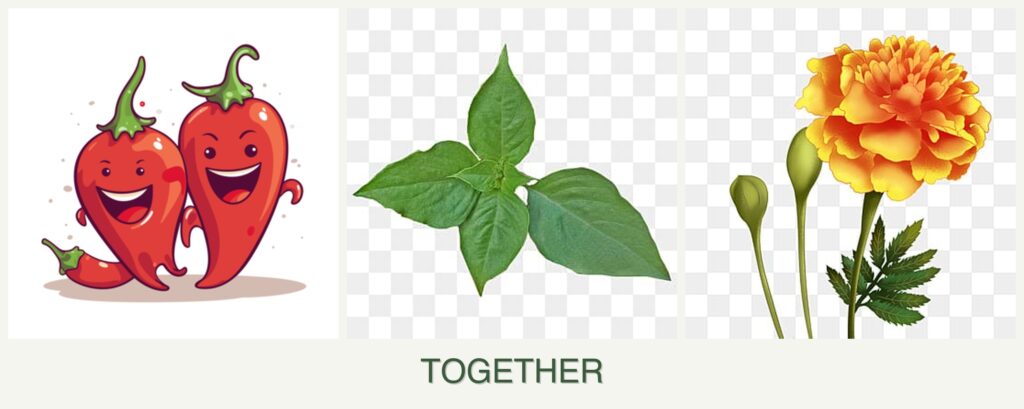
Can you plant peppers, basil and marigolds together?
Can You Plant Peppers, Basil, and Marigolds Together?
Companion planting is a gardening technique that involves growing different plants together to enhance growth, deter pests, and maximize space. Many gardeners wonder if peppers, basil, and marigolds can be grown together. This article explores their compatibility, offering insights into their growing requirements, benefits, and challenges. By the end, you’ll have practical tips for successfully cultivating these plants in your garden.
Compatibility Analysis
Yes, peppers, basil, and marigolds can be planted together. These plants complement each other well, creating a harmonious environment. Peppers and basil thrive in similar growing conditions, both preferring full sun and well-drained soil. Marigolds, known for their pest-repelling properties, help protect peppers from nematodes and other pests. Key factors such as growth requirements, pest control, and spacing make this trio a viable option for companion planting.
Growing Requirements Comparison Table
| Plant | Sunlight Needs | Water Requirements | Soil pH | Hardiness Zones | Spacing Requirements | Growth Habit |
|---|---|---|---|---|---|---|
| Peppers | Full Sun | Moderate | 6.0-7.0 | 9-11 | 18-24 inches apart | Upright, 1-3 ft. |
| Basil | Full Sun | Moderate | 6.0-7.5 | 10-11 | 12-18 inches apart | Bushy, 1-2 ft. |
| Marigolds | Full Sun | Low to Moderate | 6.0-7.5 | 2-11 | 8-12 inches apart | Bushy, 6-24 inches |
Benefits of Planting Together
Planting peppers, basil, and marigolds together offers several advantages. Marigolds act as natural pest repellents, deterring nematodes and aphids, which can harm peppers. Basil is believed to enhance the flavor of peppers when grown nearby. This combination also promotes efficient use of space, allowing gardeners to maximize their garden beds. Additionally, marigolds attract pollinators, which can benefit the overall health of your garden.
Potential Challenges
While these plants generally thrive together, they can compete for resources such as sunlight and nutrients. Peppers and basil have similar water needs, but marigolds require less frequent watering. Disease susceptibility, particularly fungal infections, can be a concern if plants are overcrowded. To mitigate these challenges, ensure adequate spacing and monitor the garden for signs of stress or disease.
Planting Tips & Best Practices
- Optimal Spacing: Maintain appropriate spacing—18-24 inches for peppers, 12-18 inches for basil, and 8-12 inches for marigolds—to allow for proper air circulation.
- Timing: Plant after the last frost date when soil temperatures reach at least 65°F.
- Container vs. Garden Bed: These plants can thrive in both containers and garden beds. Ensure containers have good drainage.
- Soil Preparation: Use well-drained, fertile soil. Add compost to enrich the soil before planting.
- Additional Companions: Tomatoes and oregano also pair well with this trio, enhancing the garden ecosystem.
FAQ Section
Can you plant peppers and basil in the same pot?
Yes, as long as the pot is large enough to accommodate their root systems and provides adequate drainage.
How far apart should peppers and marigolds be planted?
Maintain at least 12 inches between marigolds and peppers to ensure proper growth and air circulation.
Do peppers and basil need the same amount of water?
Yes, both require moderate watering, ensuring the soil remains consistently moist but not waterlogged.
What should not be planted with peppers, basil, and marigolds?
Avoid planting fennel and dill near this trio, as they can inhibit growth.
Will basil affect the taste of peppers?
Basil is believed to enhance the flavor of peppers when grown nearby, although this is subjective.
When is the best time to plant peppers, basil, and marigolds together?
Plant them after the last frost date in spring, once soil temperatures are consistently above 65°F.
By following these guidelines, you can successfully grow peppers, basil, and marigolds together, creating a vibrant and productive garden space. Enjoy the benefits of companion planting, from pest control to enhanced flavors, while maximizing your garden’s potential.



Leave a Reply